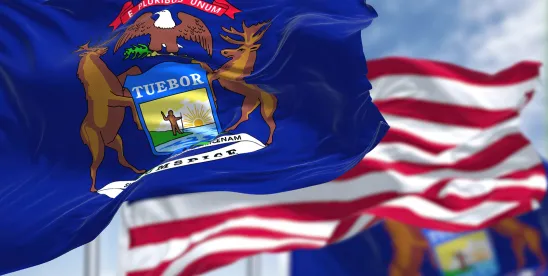The 2018 Ballot Initiatives
In 2018, two landmark ballot initiatives were circulated and approved for inclusion on the ballot for decision by Michigan voters in the upcoming general election. One initiative was to enact the Improved Workforce Opportunity Wage Act (IWOWA), which called for increasing the state’s minimum wage to $12 per hour by 2022, providing annual increases thereafter tied to inflation, and phasing out the state’s existing tip credit provisions by 2024. The other initiative was to enact the Michigan Earned Sick Time Act (ESTA), which called for requiring that Michigan employers accrue and allow use of up to 72 hours per year of earned sick time, which, depending on the employer’s size, would either be paid to the full limit of 72 hours, or for small employers, paid for the first 40 such hours per year, and unpaid for up to 32 additional hours.
The Legislature’s “Adopt-and-Amend” Approach
However, before the election, the Michigan Legislature adopted both proposed laws as written in September 2018, removing them from the Michigan ballot. Then, within the same legislative session in December 2018, the Legislature voted to amend both laws. The Legislature’s amendments delayed the increase in the minimum wage until 2030 and modified the ESTA to limit the scope of employers and employees covered by the earned sick leave requirements, the permitted uses of paid leave, and the required amounts of annual paid sick leave. The revised ESTA was renamed the Michigan Paid Medical Leave Act (“PMLA”). Both amended laws went into effect in early 2019.
The Legal Challenge
Litigation ensued to challenge the constitutionality of the Legislature’s adopt-and-amend strategy. A group of plaintiffs, with advocacy group “Mothering Justice” as the lead named plaintiff, initiated legal action in the Michigan Court of Claims in 2021. In July 2022, the Michigan Court of Claims held that the Legislature’s “adopt-and-amend” strategy violated the Michigan Constitution and ordered the initial ballot initiatives to be reinstated. The Court stayed the effective date of its ruling, however, until February 2023.
The defendants appealed the Court of Claims decision to the Michigan Court of Appeals. In February 2023, the Michigan Court of Appeals reversed the decision of the lower court and found the adopt-and-amend strategy to be constitutional.
The plaintiffs appealed the Court of Appeals’ decision to the Michigan Supreme Court. Briefing occurred and oral arguments took place December 7, 2023. On July 31, 2024, the Court issued the current decision.
The Michigan Supreme Court Decision and Rationale
The Michigan Supreme Court reversed the Court of Appeals decision and has found the “adopt-and-amend” strategy to be unconstitutional. The Court endorsed the Circuit Court’s opinion that the state Constitution limits the Legislature’s authority to adopt and amend ballot initiatives in the same legislative session. While the Court’s ruling reinstates the ESTA and IWOWA initiatives effective February 21, 2025, the end of the majority’s opinion clarified that the Legislature is free to amend the laws as it sees fit at a later session. As the initiatives were not adopted by the people at the polls, the Legislature would only need a simple majority to amend these changes.









 />i
/>i

